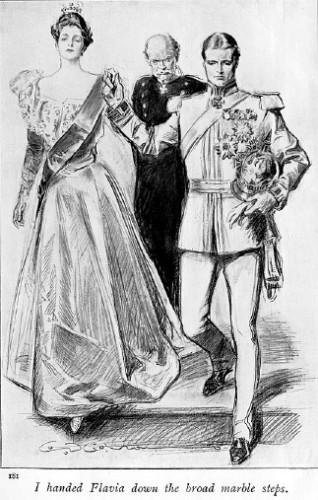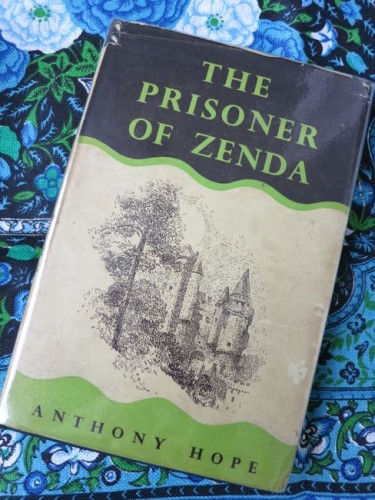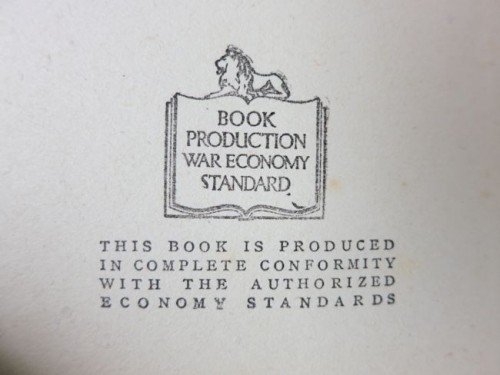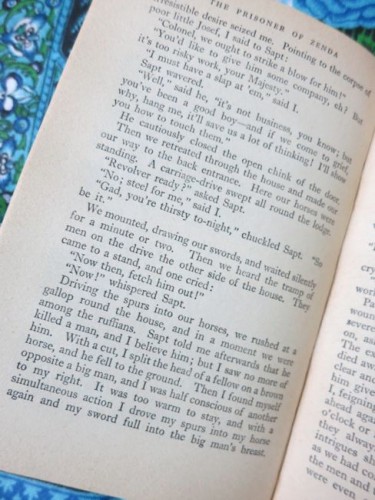OK, first off, I need to start this post with a confession.
I found out about the Prisoner of Zenda from a comment on this blog. Yes, up until a few months ago I had never heard of it. I don’t know how I (historical literature obsessed freak that I am) managed to miss it. It’s had eight film adaptions after all, launched an entire literary genre (the Ruritanian romance) and added the term ‘Ruritanian’ to our language!

Frontispiece to the 1898 Macmillan Publishers edition, illustrated by Charles Dana Gibson. Via Wikimedia Commons
Once I realised the dreadful gap in my literary knowledge, I was determined to fix it. No luck at the Wellington Public Library, no luck in any bookstore I popped in to in NZ. And then, in a secondhand bookstore just down the street from ThreadDen in Melbourne – success! And, best of all, it was the only book in the shop that wasn’t Au$20 (really, I thought that books were exorbitantly expensive in NZ, but Oz is even worse!).
So, here is my copy of The Prisoner of Zenda, read from cover to cover on the flight back from Melbourne to Wellington (in between writing blog posts and watching The Big Bang Theory).
It’s a British 1945 edition, published while wartime restrictions were still in effect.
Right. The actual review!
The Prisoner of Zenda isn’t high literature: it’s frothy escapism, late Victorian style. Its value today lies in its influence on late Victorian literature, and the way its popularity reflects the mores and desires of the time.
The Prisoner is a fantasy set in what might be called an alternative universe – late 19th century Europe just as it was, with the addition of one extra country: Ruritania, with its old fashioned monarchy, and a peculiar dependence on swordsmanship, though they clearly know what guns are. To Ruritania comes one Rudolf Rassendyl, a Englishman whose appearance causes some consternation among the populace – more even than his knowledge that his looks reflect an ancestresses dalliance with a king of Ruritanian should account for. His appearance on the eve of the coronation of a new king intertwines with kidnappings, crownings, romance, intrigue, sieges, and the inevitable swordfights.
Late Victorian it may be, but the writing feels very modern. It’s an easy read: fast paced, lively, descriptive without being over-wrought. The novel is set at a date roughly contemporaneous to its writing (1890s) but it might have been written in the 1940s, or the 1970s.
The plot is farfetched, laughable, fabulous, and launched a whole series of books set in fictional European countries featuring royal intrigues, mistaken identities, swashbuckling, honour, loyalty, the now-cliche good-and-evil twins, and unrequited love. Everything Hollywood could desire for dozens of film adaptions featuring daring swordfights and great costumes!
OK, the swashbuckling makes for great movie scenes, and fun reading, but in a way it’s the one really weak link in the book. The Prisoner is fantasy, but imagining Victorian gentlemen as accomplished swordsmen, thirsting for blood, is just ludicrous.
Funny it may be in a modern sense, looking back at the end of the 19th century, its probably one of the the things that made the books so popular at the time. It also gives the most revealing insight into the Late Victorian mindset.
Our hero is romantic, sentimental, stalwart, stoic, valiant, ruthless, not by turns, but all at the same time! The combination of strict adherence to honour at the cost of personal happiness and macho derring-do is a (perhaps unwitting) representation of the pull between the 19th century and the 20th century, between historicism and modernism, as the turn-of-the-century hero tries to cram it all in.
Or perhaps its just a silly but entertaining novel with a charming but completely unbelievable hero.




I just requested this from my local library a couple of days ago and will be picking it up a little later today. When I was requesting it I also found out that there is a sequel “Rupert of Hentzau; being the sequel to a story by the same writer entitled ‘The Prisoner of Zenda.'” Just thought I’d pass it on!
Yes, I’m aware of the sequel, and on the lookout for it. Hope you enjoy the Prisoner of Zenda!
gutenberg.orghttp://www.gutenberg.org/ebooks/1145
A free copy of the sequel, ‘Rupert of Hentzau’!
I do like your copy of ‘The Prisoner’ – so good to get a 1945 edition in such good condition. I’m glad you had fun with it – perfect aeroplane reading for all times – I imagine for the Victorians it beguiled many a train journey. It used to be seen as a story for boys, but girls always knew the joys of a good costume story to base a fantasy on!
I have never heard of this book either! Time to check out the library.
Maybe Rudolf Rassendyl was a fan of LARPing, hence the knowledge of swordsmanship?
I’ve heard of it, but have never read it. It sounds like it would make the basis of a fantastic soap opera.
One of my favorite books! Check out the 1937 film version with Ronald Coleman! *sigh*
Have a hankie ready if you read “Rupert of Hentzau”, BTW.
If I EVER get around to inventing a Steampuk persona, it will be heavily influnced by this book. Besides, the hero and heroine are gingers!!!!! 🙂
Haha! I knew you would approve of the last part!
Both Prisoner of Zenda and Rupert of Hentzau are available to download from Project Gutenberg, if you are happy to read electronically!
It’s a fun book- great for putting you in a good mood. 🙂
Heros are heros because they do things we don’t think we can. If it was meant for young victorian boys who see their dad’s in suits being all gentlemanly, well, their heros have to be than AND good with a sword! If you look a modern historical romances (which are notorious for having larger than life characters) you get the same thing…ladies who are incredibly gorgeous but extremely capable (and they foreswear the use of corsets because they are slim enough to not need one and it restricts their movements) and men who are manly men who are masters at the art of war and are natural leaders, but deep down they are super sensitive, intellegent and loving. I think it is the rare human being who would actually possess all of these traits in such high quantities. That is why it is called fiction!
I guess I like my heros more realistic – not so realistic as to be burdened with fatal hubris a la the ancient Greek heros, but feet of clay don’t turn me off at all! I loathe the modern romance of the “independent heroine who eschews corsets” variety. Most over-used historical cliche ever!
In the same vein, do you know Oppenheim? So fun! And a (for the time) many plucky ladies. Also…secret societies, aristocracy, and signature perfumes!
E. Phillips Oppenheim? I think I’ve read the Golden Web, which he wrote under a different name. I must go look up the rest of his work!
Exactly!
I don’t know if you’ve ever seen “Adam Adamant Lives”, but if you haven’t … it was a BBC TV series produced in 1966, about *exactly* that sort of Edwardian hero transplanted to Swinging London. He came complete with cape and sword cane!
Inspired by you, I re-read ‘The Prisoner of Zenda,’ too. Had no idea there was a sequel — definitely going to put it on my Kindle.
Jamie Fraser from ‘Outlander’ and Rudolf Rassendyl are my new fave red-headed fictional heroes.
I thought you didn’t like redheads 😉